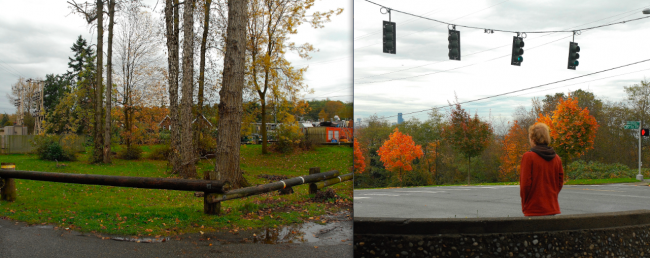Nickelsville tent city may return permanently to where it started, in West Seattle
Pictured are two of seven sites recommended by the City for a 'permanent' Nickelsville. These two are located in West Seattle. Left is 5601 Southwest 23rd Avenue, just east of Delridge at Findley. Right is the vacant city land on 35th Avenue at Edmunds, across the street from Providence Mount St. Vincent, northwest of Camp Long.
Thu, 10/28/2010
Nickelsville, the pink-tented city that first put down stakes in West Seattle two years ago may end up here again, permanently. Two months ago the City of Seattle appointed a panel of 10 homeless advocates to recommend a permanent plan for the future of Nickelsville and its residents, Nickelodeans. Currently, 100 people reside in Nickelsville at a total cost of $3000 month plus $1200 for bus tickets. The encampment is currently located at University Congregational United Church of Christ on 15th Avenue Northeast and Northeast 45th Street and can remain until mid-November.
The City just released seven possible sites, two in West Seattle. One is on 35th Avenue SW at Edmunds, a few hundred feet south of, and up the hill from, the Rotary Totem Pole and across the street from Providence Mount St. Vincent. The other is at 5601 Southwest 23rd Avenue, called the Delridge Substation and one block east of Delridge Way and Southwest Findley Street.
The other five options include the Interbay substation at 3222 17th Ave W., the median of Industrial Way South at South Adams Street in Sodo, City sign-shop property at Airport Way South and South Snoqualmie Street in Sodo, the north end of the temporary playfield area at Smith Cove in Magnolia, and City property off Stone Avenue North between Northwest Hospital and Aurora Avenue North.
The West Seattle Herald asked panelist member, Real Change newspaper founder, Timothy Harris, to update our readers on the sites and the panel's vision of a permanent Nickelsville.
First off, Harris seems to find his panel's official name, "The Citizen Review Panel on Housing Services for Seattle's Unsheltered Homeless Population" a bit cumbersome.
"You know what? I've been calling it the 'Encampments Panel," he said. "The City inventoried all of their property and ruled out the ones that would not do for one reason or another. This list that they're floating reflects possibilities, but we need just one location. It's a function of simply where the city has property available that meets the basic criteria we're after, very much a 'first cut.'"
So how permanent is permanent?
"'Permanent site' is kind of an elastic term," Harris said. "We've been referring to it as a 'semi-permanent site.' Permanent means forever, and forever is a very long time. We're looking for some place that would suffice for a couple of years. We don't think it serves any legitimate purpose for Nickelsville to be moved every three months. If we can find a site that offers stability for at least a couple of years we'll be doing all those folks a great service.
"The range ( of residents) is 100 to 150. There will be assessments along the way. If it looks like they're capable of going above that number at that site or splitting off to find another site than that's a possibility. Initially we think the cap of 150 lets us test how well it is working as we go along."
Harris said that Seattle has close to 9,000 homeless people, and officially about 2,000 sleeping on the streets.
"Everybody knows that's an artificially low number because the whole point when you're sleeping out is to be tough to spot and not be vulnerable so that others can find you," he said, referring to City-sponsored one-night counts where volunteers fan out and seek those without shelter.
Still, Harris is optimistic, and pleased with the Mayor's handling of the issue of homelessness.
"The difference between (Mayors) Nickels and McGinn on this issue is night and day," Harris said. "Nickels stonewalled advocates. McGinn has embraced the advocacy community and recognized that we are the experts that need to be consulted in drafting solutions."
"Nickelsville" was given its name by some of the homeless and their advocates because of the former mayor's perceived negative approach to Seattle's homeless problem.
"Nickels adopted a purely punitive policy, criminalizing homeless survival activities. McGinn recognizes that we need to make things easier for (homeless) people, not harder. He has already significantly rolled back the punitive aspects of the Nickels approach to urban camping. What we've moved from is a zero-tolerance policy of urban camping to a policy that says unless there are complaints and people are creating a problem they should be left alone."
The panel itself recommended zero-tolerance for those with weapons, drugs, lack ID, or are sex-offenders. They would be turned away.
"Nickels cracked down on urban camping, and had the perception that the visible urban poor were the fly in the ointment of the condo boom and of new residents being afraid of homelessness. It was when all of the cranes started appearing downtown that he adopted the zero-tolerence policy. It was just about driving them out of town."
Other panelists include Alison Eisinger, Seattle-King County Coalition on Homelessness, executive director, Bill Hobson, Downtown Emergency Service Center, executive director, Vince Matulionis, United Way of King County, Bill Block, Committee to End Homelessness, project director, Sheila Sebron, Committee to End Homelessness, veteran, Michael Ramos, Church Council, executive director, Bill Hallerman, Catholic Community Services, director, Amy Hagopian, University of Washington, and Tom Tierney, Seattle Housing Authority, executive director.


